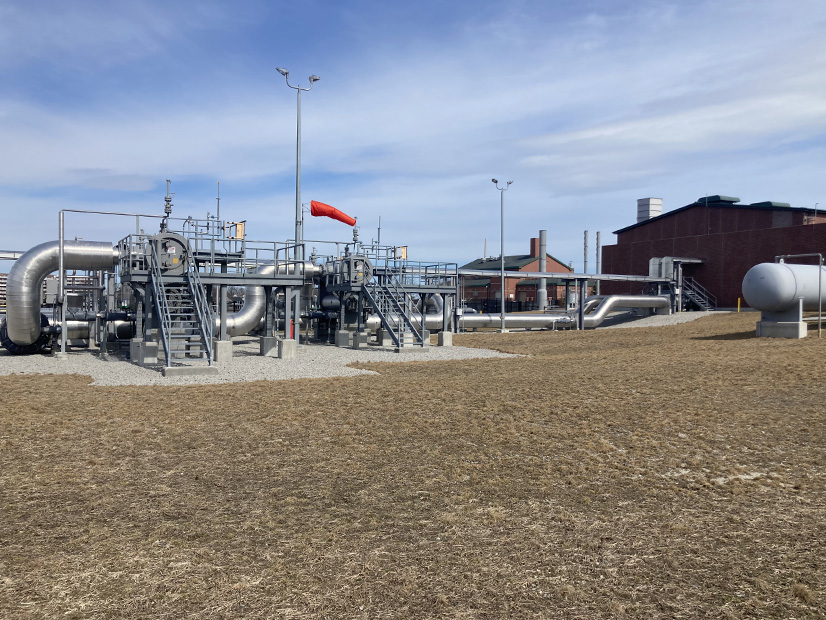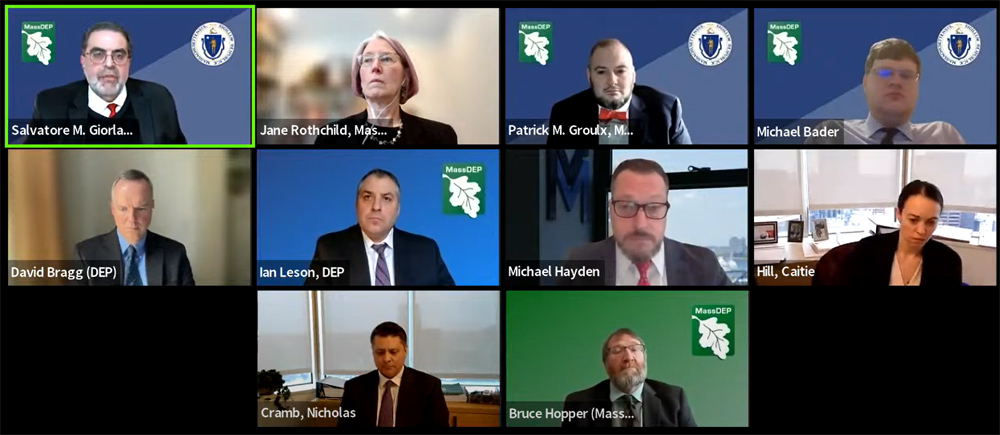The attorneys representing the Massachusetts Department of Environmental Protection, Enbridge subsidiary Algonquin Gas Transmission and a group of 10 residents presented their final arguments in a department adjudicatory proceeding Jan. 31 over the waterways license of the company’s embattled natural gas compressor station in the city of Weymouth.
The hearing is the latest in the ongoing saga over the Weymouth compressor station. Algonquin submitted its application for the at-issue waterways license in 2015. It was approved in 2019 but was later sent back to MassDEP following a court appeal.
The compressor station was constructed as part of Enbridge’s Atlantic Bridge Project, aimed at increasing the south-to-north capacity of the Algonquin and Maritimes & Northeast pipeline systems. FERC gave the facility final approval in 2020 (CP16-9), and it began operations in 2021.
While state officials and lawmakers frequently speak of the importance of environmental justice, the residents opposing the compressor station have cast the ongoing proceedings as a key litmus test for Gov. Maura Healey’s administration. It was sited close to industrial facilities, including fuel storage tanks, two gas plants, a chemical manufacturing facility and the largest hazardous waste disposal site in New England; residents of the surrounding area have long argued that their community already hosts more than its fair share of polluting infrastructure.
The focus of the Jan. 31 hearing was whether the station meets the definition of an “ancillary facility” to a section of the Algonquin system known as the “HubLine” and therefore requires an adjacent location. The HubLine runs beneath the Fore River, Boston Harbor and Massachusetts Bay to connect with the Maritimes & Northeast system, which heads north to Nova Scotia.
Attorneys for Algonquin and MassDEP argued that the station requires an adjacent location and was therefore correctly sited at its existing location, while the attorney representing residents argued against the need for an adjacent location.
Nicholas Cramb, the attorney representing Algonquin, said siting the station at its existing location limited the waterways impacts compared to all alternative locations, which would have required suction and discharge pipes with additional waterways impacts.
Cramb’s position was supported by David Bragg, senior counsel for MassDEP, who said the department “determined that the location at the site — already in industrial use, already part of the infrastructure crossing facility, without the need to disturb a square foot of jurisdictional tidelands in another area — … was the appropriate location, and that it was required to be there.”
Michael Hayden, the attorney representing the residents, made the case that the compressor station did not require an adjacent location to the HubLine because the line simply does not need it to operate. He emphasized that the HubLine operated without the station for more than a decade.
“The gas is not being pushed through the compressor station for local distribution. This is going to Canada; it’s going to Maine,” Hayden said, adding that the station provides “no discernible benefit to our Massachusetts residents.”
Cramb responded that the petitioner’s argument that the line can send gas north to south without the station is “irrelevant.”
Without the compressor, the relevant portion of the gas system cannot move enough gas “to satisfy the purposes of the Atlantic Bridge Project and Algonquin’s contracts,” Cramb said. He called the assertion that the station provides no benefits to Massachusetts residents “absolutely a false statement,” noting that one of Algonquin’s customers is a power plant in Salem.
Hayden also made the case that, because the station remains under review by MassDEP, it should be subject to the environmental justice provisions of the state’s 2021 “Next Generation Roadmap” law on climate policy.
The law requires an environmental impact report (EIR) for projects likely to cause environmental damage located in or near state-designated environmental justice communities. Hayden argued that the law dictates that the EIR could be triggered “at any stage of the review process.”
Hayden also noted that the station is located within 1 mile of multiple environmental justice communities. A 2019 state health assessment found that nearby residents face higher risks of health conditions linked to air pollution, including lung cancer, heart attacks, heart disease and pediatric asthma. Hayden has argued that gas released from the compressor poses an added threat to the community.
Hayden requested that the MassDEP Office of Appeals and Dispute Resolution (OADR) “remand this entire application and project back to the department to complete the environmental justice review that’s required under the 2021 climate act.”
Cramb and Bragg both argued that the EIR requirement does not apply to the station because the 2021 law was intended to apply only to new projects, whereas the waterways application was filed in 2015.
In its pre-filed closing brief, Algonquin added that “it is clear that [the law] does not require that Algonquin file an EIR for the compressor station because the compressor station is not subject to [Massachusetts Environmental Policy Act] review.”
Following the conclusion of the final arguments on Jan. 31, Chief Presiding Officer Salvatore Giorlandino of the MassDEP OADR will make a recommended final decision to DEP Commissioner Bonnie Heiple.
Heiple, who was appointed by Healey in March, will then be tasked with making the final decision on the proceeding.





